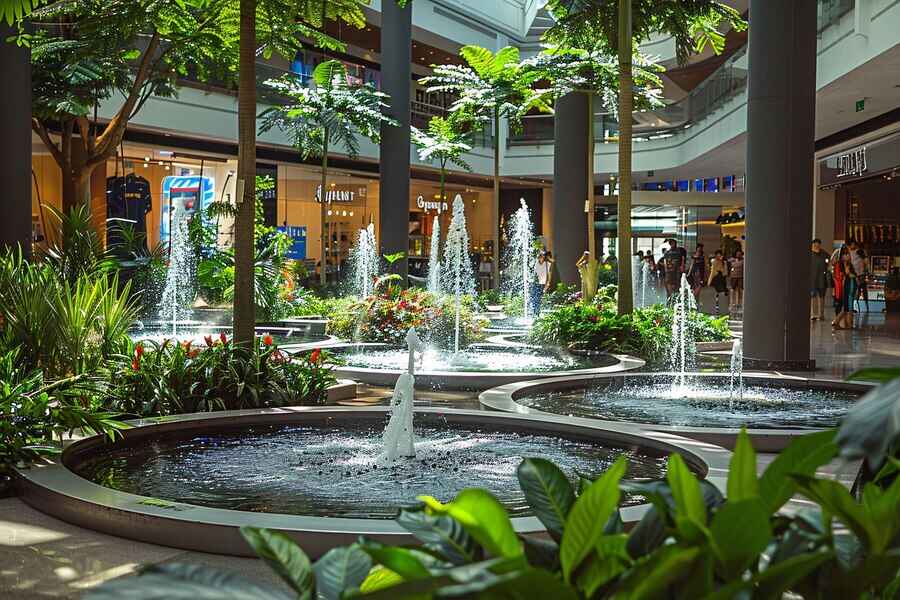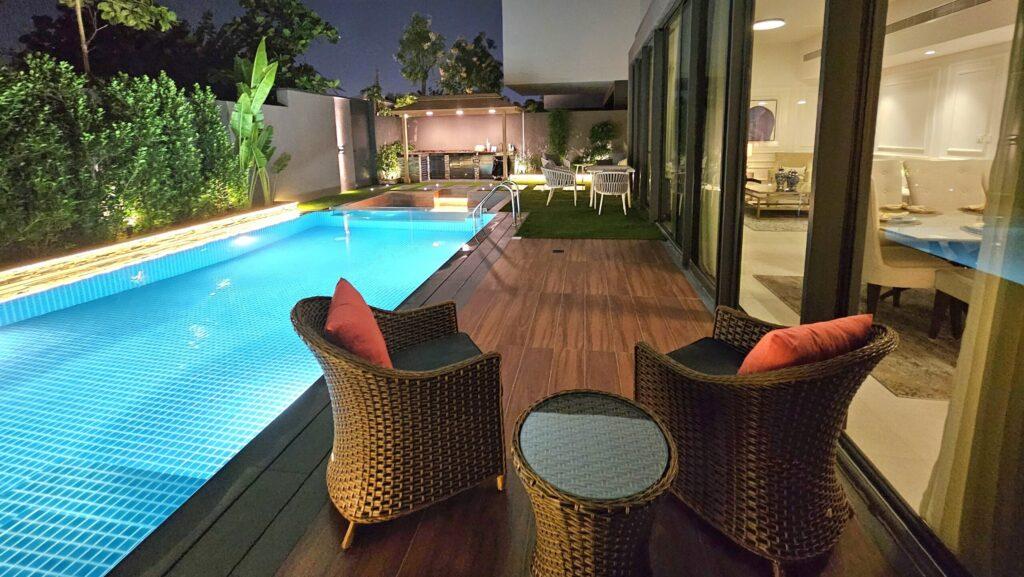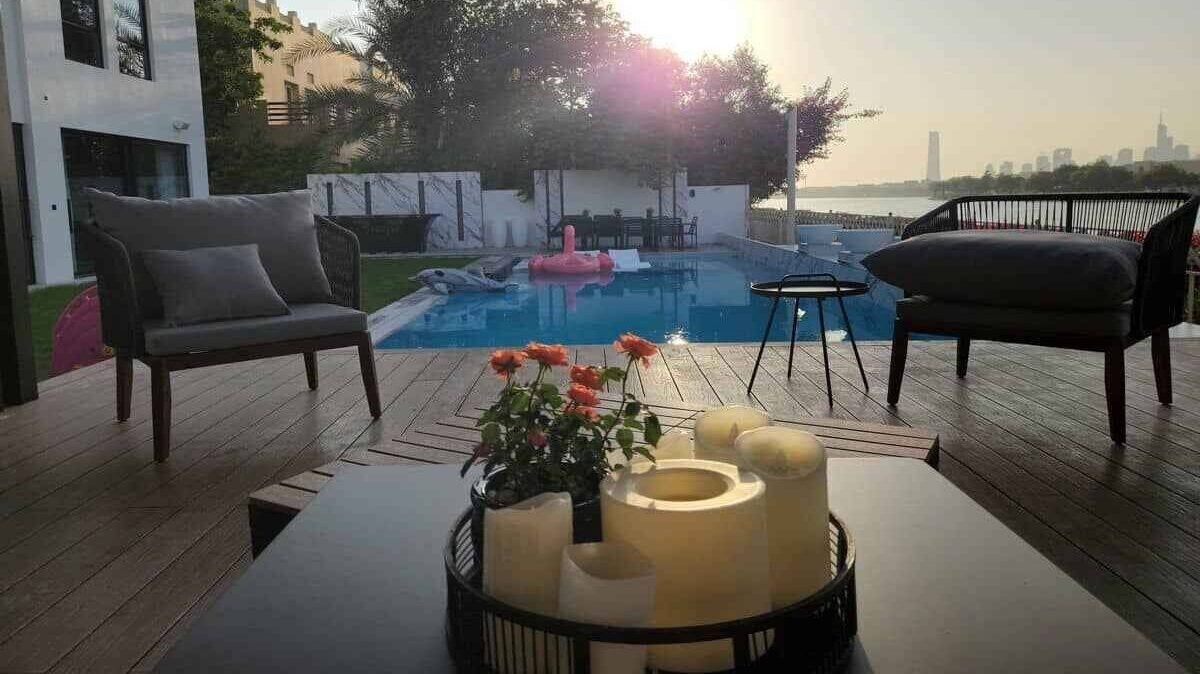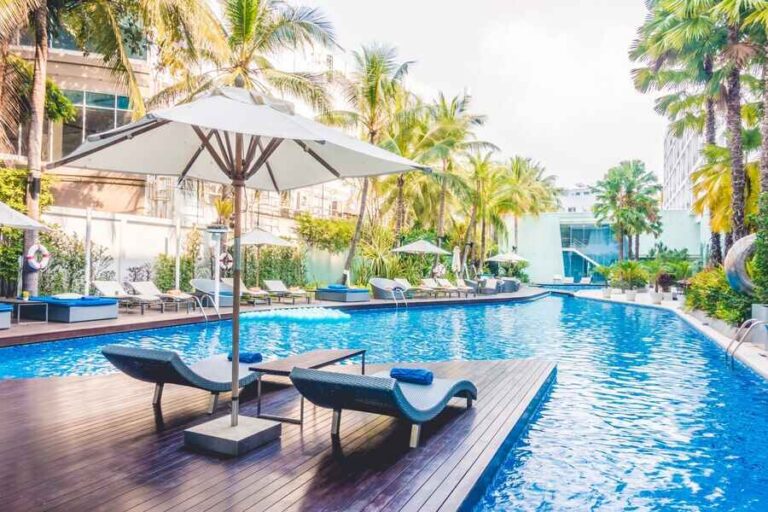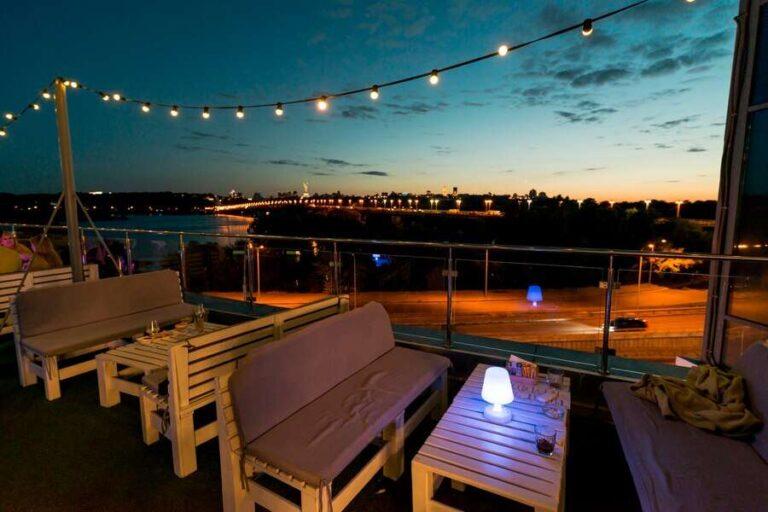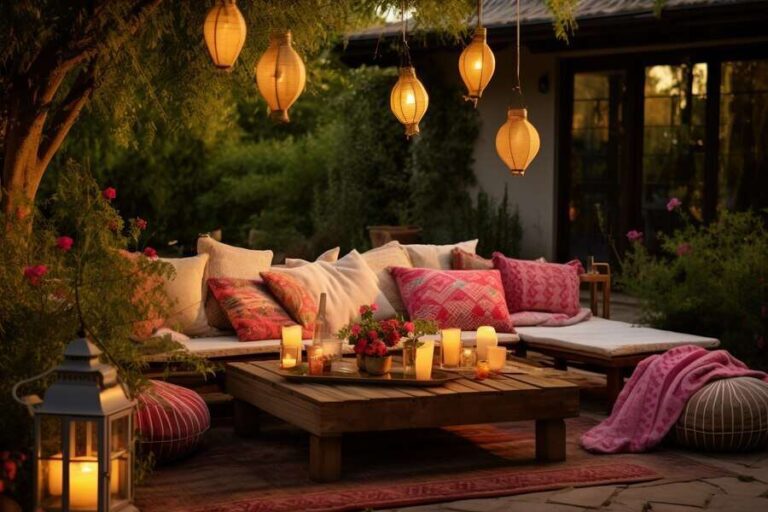Introduction: Planning Landscape Design in Dubai
Garden design in Dubai is interesting and challenging because of the city’s particular climate. You can create a great outdoor space that works well in the heat with the right planning. This guide will help you with important tips for designing your garden so that it looks beautiful and stays healthy. Read on to learn how to get the most out of your garden in Dubai.
Understanding the basics of landscape design
When you’re planning how to design a garden in Dubai, it’s important to start with the basics. This section covers key ideas and principles to help you create a beautiful and functional outdoor space.
What is Landscape Design Architecture?
Landscape Design Architecture is all about planning and creating outdoor areas that are both artistic and functional. It combines knowledge of botany, horticulture and design to create spaces that look good and function well. In Dubai, this means creating gardens that are attractive and useful while also being able to handle the harsh climate.
Principles of landscape design
To design a successful garden, you need to follow some important principles:
Scale:
Scale refers to how different parts of your garden relate in size. It’s important to choose plants, furniture, and other features that fit well in your space. In Dubai, where gardens range from small to large, scale keeps everything in harmony.
Simplicity:
Keeping your design simple helps avoid clutter. Focus on a few key elements and repeat them throughout your garden. It gives a unified and stylish appearance that is easy to maintain, especially in Dubai’s harsh climate.
Emphasis:
Emphasis means highlighting certain features to catch the eye. It could be a striking plant, a water feature, or a piece of art. In Dubai, where green spaces can be limited, creating focal points makes your garden more interesting and attractive.
Balance:
Balance ensures your garden feels stable and orderly. There are two types:
Symmetrical (formal) and Asymmetrical (informal).
Symmetrical balance mirrors elements on each side of a central point, while asymmetrical balance uses different elements that still feel good together. Both types can work well in Dubai depending on the style of your garden.
Types of Landscape Design in UAE
In Dubai, there are different styles of landscape design, each offering its own unique look and feel:
Formal landscaping:
This style uses geometric shapes, straight lines and balanced patterns to create a clean and beautiful garden.
Coastal Landscaping:
Inspired by the beach, coastal gardens use sandy colors, driftwood, and plants that thrive in sandy soil to create a seaside atmosphere.
Woodland:
Woodland gardens have a natural, relaxing setting with lots of trees, shrubs and ground cover plants, intended to create a peaceful forest environment.
Mountain Landscape:
Mimicking mountainous terrain, this style incorporates rocks, boulders and alpine plants for a rugged, natural look that can handle Dubai’s hot weather.
Tropical Landscape:
These gardens are lush and colorful, with lush foliage and vibrant flowers. In the challenging climate of Dubai, the use of hardy tropical plants can achieve this exotic look.
Mediterranean landscaping:
Drought-tolerant plants, terracotta pots, and gravel paths define this style, which thrives in Dubai’s heat with minimal watering.
Japanese Landscaping:
Known for simplicity and serenity, Japanese gardens include water features, rocks and carefully pruned plants to create a peaceful atmosphere.
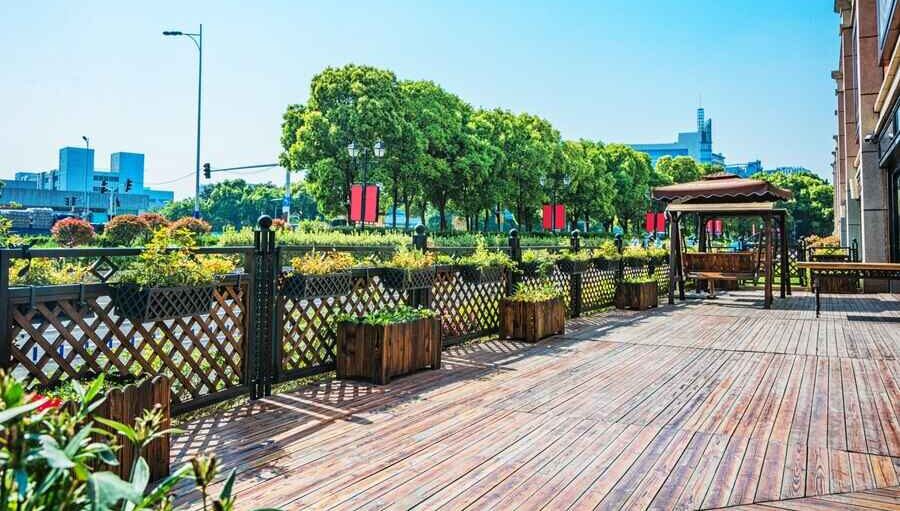
Choosing the Right Plants
Choosing the right plants is crucial for designing a successful garden in Dubai. The city’s hot weather and limited water mean you need plants that can thrive in these tough conditions while still looking beautiful. Here are some plants that do well in Dubai’s climate:
Bougainvillea: This plant is famous for its bright flowers and can survive well in Dubai’s hot and dry climate with minimal watering.
Date Palm: A symbol of the desert, date palms provide shade and can handle Dubai’s high temperatures and dry weather.
Oleander: This shrub blooms with colorful flowers and adapts well to hot climates, needing little water to thrive.
Frangipani: Also called plumeria, this tropical plant can withstand Dubai’s heat and adds a lovely fragrance with its flowers.
These plants not only survive but can thrive in Dubai’s challenging climate, making them ideal choices for a sustainable and attractive garden.
Sustainable and Low-Maintenance Plants
Choosing sustainable and low-maintenance plants will save you time, effort, and water. Here are some options:
Succulents: Plants like aloe vera, agave, and various cacti are perfect for Dubai. They store water in their leaves, making them ideal for dry conditions.
Lavender: Lavender is not only beautiful but also drought-tolerant. Its aromatic flowers can create a lovely atmosphere in your garden.
Rosemary: This hardy herb is both decorative and useful in the kitchen. It thrives in dry soil and requires little water.
Desert Rose (Adenium): This plant is native to arid regions and is well-suited to Dubai’s climate. Its striking flowers and unique shape make it an attractive addition to any garden.
Layering your garden beds adds depth and makes your garden more interesting.
Here’s how you can do it:
- Tall plants at the back: Place taller plants such as trees, tall shrubs or large grasses at the back of your garden.
- Medium plants in the middle: In front of tall plants, place medium-height ones such as small shrubs, flowering plants, or herbs.
- Small plants at the front: At the very front, add small plants such as groundcovers, small flowers, or low-growing succulents.
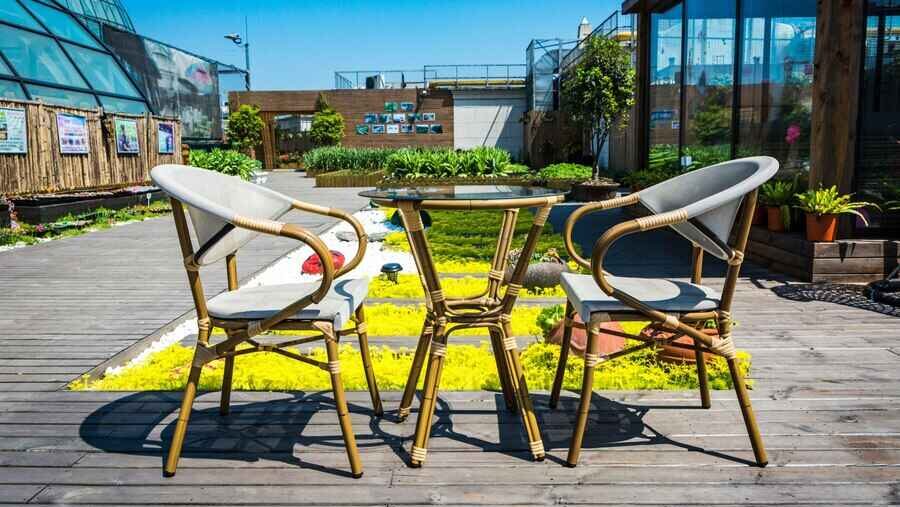
Enhancing Your Outdoor Space
Creating a beautiful garden in Dubai involves more than just picking plants. Adding smart design features can make your outdoor space more useful and attractive. Here’s how you can enhance your garden:
Outdoor Living Areas:
These spaces can turn your garden into a place for relaxing and socializing.
Outdoor Kitchens:
You can cook and eat outside with a grill, sink, and counter. Make sure there’s shade to stay cool.
Dining Areas:
Set up a sturdy table and chairs that can handle the heat and occasional sandstorms. Add shade with an umbrella or pergola.
Entertainment Areas:
Create spots for hanging out with lounge chairs, a fire pit, or a small bar. Comfortable seating and soft lighting make these spaces inviting both day and night.
Adding a Water Ffeature:
Water features bring relaxation and coolness to your garden. Consider these options:
Fountains:
Small fountains make soothing sounds and movements. Choose a design that suits the style of your garden.
Pond:
If space permits, a pond with fish or aquatic plants can add beauty and interest.
Waterfalls:
Waterfalls make wonderful focal points and help cool the area. Make sure they are designed for minimal water use and maintenance.
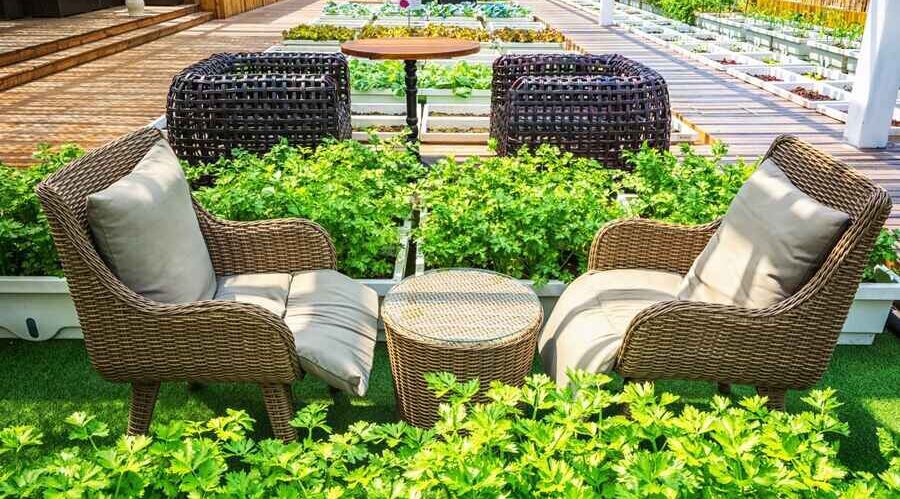
Adding Functional Elements
Incorporating functional elements into your landscape design in Dubai is essential to creating a functional and enjoyable outdoor space. These elements ensure that your garden is not only beautiful but also usable and compliant with local regulations. This section covers important aspects of space planning, furniture, and planning.
Space Planning and Schematic Layout
Effective space planning is essential to a well-designed garden. Here’s how to create a schematic layout that works for your space:
Assess Your Space:
Start by measuring your garden and noting existing features such as trees, walls and paths. Consider how you want to use the space—whether for dining, lounging, or gardening.
Define Zones:
Divide your garden into different zones based on their function. For example, set aside spaces for outdoor kitchens, dining, lounges and gardening. It helps organize the space and makes it more functional.
Create Flow:
Make sure there is a natural flow between different zones. Use paths to connect areas and make navigation easier. Consider placement of entrances and exits to improve accessibility.
Multipurpose Furniture for Versatility
Using multi-purpose furniture can make your garden more useful, especially if it’s not too big. Here are some ideas:
- Storage Benches: Benches with storage inside give you a place to sit and also store things like garden tools, cushions, or toys.
- Changing Tables: Tables that can change height or size are convenient. You can use them for dining, as a coffee table, or even for work.
- Folding Chairs: Folding chairs are good for saving space. You can easily put them away when you don’t need them and bring them out when you do.
- Outdoor Sofas: Consider sofas that you can move around or make larger. Modular furniture lets you change the way you sit to suit your needs.
Planning Regulations to Consider
When designing your garden in Dubai, it is important to follow the local rules. Here are important things to keep in mind:
Building Permits:
Check if you need a permit for structures like pergolas, outdoor kitchens, or large water features. This helps you avoid fines and ensures compliance with regulations.
Water Consumption:
Due to the dry climate in Dubai there are strict rules. Use plants that require less water and an efficient irrigation system. Recycled water can also be a good option.
Property Boundaries:
Make sure anything you build or plant stays within your property lines. Avoid planting large trees too close to borders to prevent problems with neighbors or underground utilities.
Environmental Impact:
Consider how your garden affects the environment. Use eco-friendly materials, native plants, and sustainable practices to reduce your garden’s impact on the environment. This is in line with Dubai’s goals for sustainability

Lighting and Accessories
Adding lights and accessories to your garden in Dubai can make it more beautiful and useful, especially at night. These things not only make your garden nicer in the evening but also give it more style. Here’s why landscape lighting is important and tips for decorating your outdoor space:
Landscape Lighting:
Techniques and Benefits Good lighting can make your garden look magical at night. Here are different ways to light up your garden and why they’re good:
Pathway Lighting:
Put lights along paths so people can walk safely at night. Solar-powered lights are a good choice because they save energy and are easy to use.
Accent Lighting:
Use accent lights to show off special parts of your garden, like statues, water features, or unique plants. This makes these parts stand out and makes your garden look deeper.
String Lights:
String lights are flexible and add a cozy feeling to any garden. Hang them over seating areas, pergolas, or trees to make the garden feel warm and inviting.
Spotlights:
Use spotlights to light up bigger areas like patios or outdoor kitchens. They give strong, focused light that makes these areas safer and easier to use.
Underwater Lighting:
If you have a pond or water feature, lights underwater can make it look amazing. They make the water glow and show off how it moves.
Good lighting means you can enjoy your garden more after dark, whether you’re relaxing or having friends over.
Accessorize to Enhance Aesthetic Appeal
Adding accessories can give your garden more personality and style. Here are some simple ideas:
Decorative Pots: Bright and textured pots can add color and interest to your garden. Use different sizes and styles for variety.
Outdoor Rugs: Rugs can make seating areas feel cozy. Pick ones that are tough enough to handle Dubai’s weather.
Cushions and Throws: Cushions and throws add comfort and color to your seating areas. Choose fabrics that are strong and easy to clean.
Garden Art: Add sculptures, wind chimes, or mosaics to your garden. These can be focal points and show off your personal taste.
Bird Feeders and Baths: Attract birds with feeders and baths. This enhances your garden’s beauty and helps local wildlife.
Creating Atmosphere with Pathways and Materials
The materials you choose for pathways and hard surfaces in your garden can greatly affect its look. Here are some simple tips:
Natural Stone:
Stone paths give a classic and rustic look. Stones like limestone or sandstone are durable and blend well with nature.
Gravel:
Gravel is a budget-friendly and easy option. It provides good drainage and is great for informal, winding paths.
Pavers:
Concrete or brick pavers offer a more formal appearance. They come in different shapes and colors, allowing for creative patterns.
Wood:
Wooden paths or decks add warmth and texture. Make sure the wood is treated to withstand Dubai’s climate and prevent rotting.
Combining Materials:
Mix different materials for a unique effect. For instance, combine gravel with stepping stones. Mixing materials can create contrast and highlight different areas of your garden.
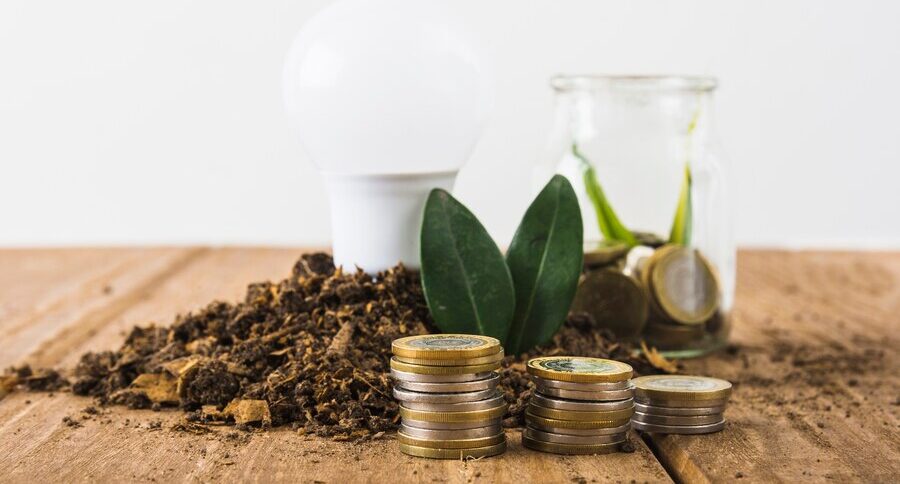
Sustainable and Cost-Effective Solutions
Creating a sustainable and cost-effective garden in Dubai is not only environmentally responsible but also practical. Given the city’s hot climate and limited water resources, using sustainable practices and materials can help you maintain a beautiful garden without breaking the bank. This section covers water-saving techniques, sustainable materials, and budget-friendly tips.
Water-Saving Techniques
Water conservation is crucial in Dubai’s arid climate. Here are some effective water-saving techniques for your garden:
Drip Irrigation:
Install a drip irrigation system to deliver water directly to the roots of your plants. This minimizes water waste and ensures that your plants receive the necessary moisture.
Mulching:
Apply a layer of mulch around your plants to retain soil moisture and reduce evaporation. Mulch also helps control weeds and improve soil health.
Rainwater Harvesting:
If possible, set up a rainwater harvesting system to collect and store rainwater for garden use. This can significantly reduce your reliance on municipal water supplies.
Watering Schedule:
Water your garden during the early morning or late evening when temperatures are cooler. This reduces evaporation and ensures that more water reaches the roots.
Drought-Tolerant Plants:
Choose plants that require minimal water and are adapted to dry conditions. Succulents, cacti, and certain shrubs are excellent choices for a water-wise garden.
Sustainable Materials
Using sustainable materials in your garden can help protect the environment and make your space more eco-friendly. Here are some simple ideas:
Recycled Materials:
Use recycled items for pathways, furniture, and decorations. Things like reclaimed wood, recycled plastic, and old bricks can give your garden a unique, green touch.
Eco-Friendly Pavers:
Choose pavers made from sustainable materials like permeable concrete or natural stone. Permeable pavers let water soak through, which reduces runoff and helps refill the groundwater.
Composting:
Set up a compost bin for garden waste and kitchen scraps. Composting improves soil quality and cuts down on the need for chemical fertilizers.
Native Plants:
Use native plants in your garden. They are adapted to the local climate, so they need less water and care.
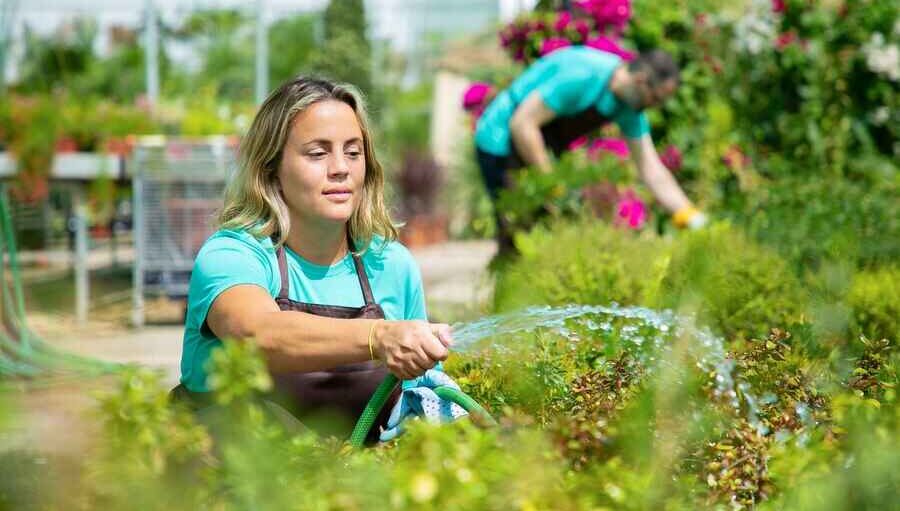
Maintenance Tips for a Beautiful Garden
Regular Watering and Irrigation
Maintaining a beautiful garden in Dubai requires regular maintenance, especially with the city’s harsh climate. Here are some simple tips to beautify your garden:
Consistent Schedule:
Water your plants on a regular schedule. Early morning or late evening is best because cooler temperatures help reduce water loss due to evaporation.
Drip Irrigation:
Use a drip irrigation system to water your plants directly at the roots. This saves water and ensures that your plants get the moisture they need.
Watering Depth:
Water your plants deeply so that the water reaches at least six inches into the soil. This helps develop strong roots and keeps your plants healthy. Underwatering can make plants weak and stressed.
Pruning and Trimming
Regular pruning and trimming helps maintain the shape and health of your plants. Here’s how to do it effectively:
Deadheading:
Remove spent flowers to encourage new flowers and prevent the plant from putting energy into seed production. It keeps your garden clean and vibrant.
Shape Maintenance:
Trim shrubs and hedges to maintain their shape and prevent overgrowth. Pruning also improves air circulation and reduces the risk of disease.
Remove Dead or Diseased Parts:
Check your plants regularly for dead, damaged or diseased parts and remove them immediately. This helps prevent the spread of disease and keeps plants healthy.
Fertilization and Soil Care
Healthy soil is key to a thriving garden. Here are some easy tips for taking care of your soil:
Soil Test:
Check your soil’s nutrients and pH levels. This helps you pick the right fertilizers to keep your soil healthy.
Organic Fertilizers:
Use natural fertilizers like manure, compost, and bone meal. These provide essential nutrients without harming the environment.
Mulching:
Put mulch around your plants to keep the soil moist, regulate its temperature, and prevent weeds. As mulch breaks down, it adds organic matter to the soil.
Pest and Disease Management
Keeping your garden healthy means dealing with pests and diseases. Here’s how to handle them:
Check Often:
Regularly inspect your plants to catch any problems early. The sooner you spot pests or diseases, the easier it is to deal with them.
Attract Good Insects:
Bring in helpful insects like ladybugs and birds, which naturally reduce pest populations. Avoid using strong chemicals that can harm these beneficial creatures.
Use Natural Solutions:
Treat your garden with organic methods like neem oil, insecticidal soap, or homemade sprays. These are safer for your plants and the environment.
Seasonal Maintenance
Adjust your grooming routine to the changing seasons. Here are some tips for seasonal care:
Summer Care:
During the hot summer months, provide extra water and shade for your plants. Mulch heavily to retain moisture and prevent soil erosion.
Winter Preparation:
In the cooler months, protect sensitive plants from temperature fluctuations. Cover them with cool cloths or bring potted plants indoors.
Spring Cleaning:
In the spring, remove dead plant material, clean up fallen leaves, and prepare your garden for new growth. This is also a good time to freshen up the mulch and add compost.
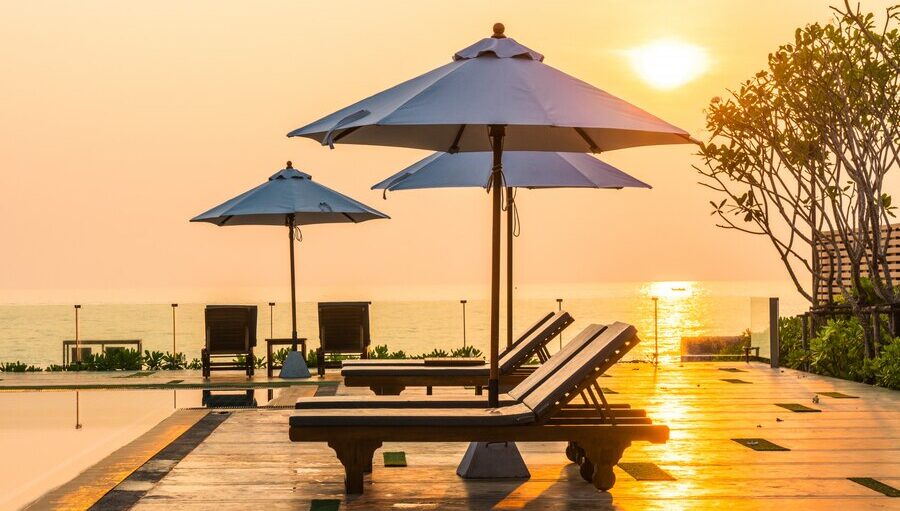
Final Thoughts on Landscape Design in Dubai
Creating and maintaining a stunning landscape in Dubai requires careful planning, creativity and constant maintenance. As you begin your landscaping journey, here are some final thoughts to keep in mind:
Embrace the diversity of Dubai’s climate
Dubai has a unique climate, characterized by hot summers and mild winters. Embrace this diversity by choosing plants and design elements that thrive in those conditions. Choose heat-tolerant plants, efficient irrigation systems, and durable materials that can withstand harsh sun and occasional sandstorms.
Balance aesthetics with functionality.
A successful garden not only looks beautiful but also serves practical purposes. Balance aesthetics with functionality by incorporating outdoor living spaces, functional pathways, and versatile furniture. Create zones for dining, lounging and gardening to maximize the use of your outdoor space.
Incorporate Sustainable Practices
Creating a sustainable garden in Dubai is a must. Use methods that save water, such as efficient irrigation, and choose materials that are good for the environment. It helps reduce waste and supports native plants and animals.
Regular Maintenance is Essential
Regular maintenance of your garden is very important. Water, trim, fertilize and protect your plants from pests regularly. As the weather changes in Dubai, adjust your routine to keep your plants healthy and looking good all year round.
Seek Professional Advice When Needed
If you are unsure about some landscape design or maintenance aspect, don’t hesitate to seek professional advice. Consult local landscapers, garden centers, or horticulturists like Hello Landscape and Pool LLC who specialize in Dubai’s unique environment. They can provide valuable insight and recommendations tailored to your garden’s specific needs.
Enjoy the Process and be Patient
Creating a beautiful garden takes time and effort. Enjoy the process of designing, planting and maintaining your garden. Take pride in watching your plants grow and develop over time. Remember that gardening is a journey of learning and discovery.
Conclusion
Landscaping in Dubai offers endless possibilities to create an outdoor oasis that reflects your style and enhances your lifestyle. By incorporating the principles of sustainability, functionality and creativity, you can create a garden that not only survives, but thrives in Dubai’s harsh climate.


